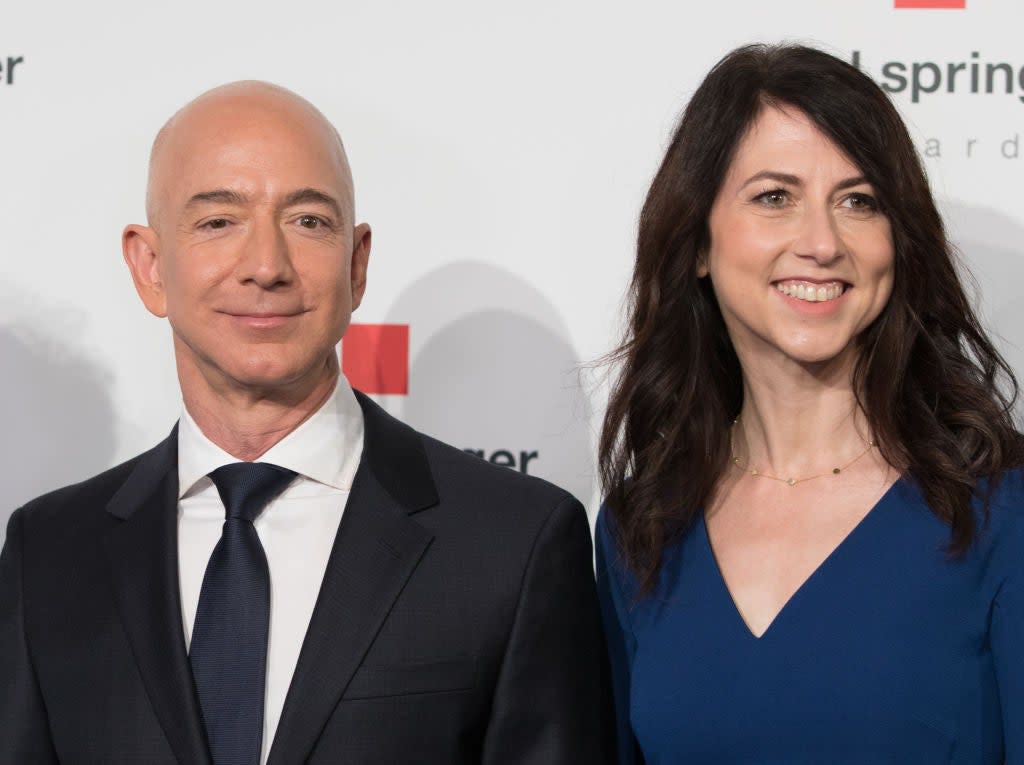MacKenzie Scott’s billionaire philanthropy proves we need a proper taxation system

- Oops!Something went wrong.Please try again later.
As details have emerged of MacKenzie Scott’s $4.2bn (£3.1bn) giving spree it has become very clear that this isn’t your garden variety billionaire philanthropy.
Scott, a novelist and one of the world’s richest women following her divorce from Amazon founder Jeff Bezos, has donated to food banks, YMCA and YWCA organisations, other non-profits serving those crushed under the heel of the economic crisis delivered by the pandemic.
She’s also been funding institutes of higher learning. But these are not the world-famous institutions that tend to be the recipients of seven figure-plus donations from well-heeled alumni.
Scott has endowed historically black college or universities (HBCUs), originally set up to provide an education for African American students when other doors were closed due to them through segregation. Also on her list were places that serve women, other minorities, rural communities, the poor.
They don’t include Harvard or Yale, they do include Prairie View A&M, Morgan State and the University of Maryland Eastern Shore.
Tony Munroe, president of Borough of Manhattan Community College, told the New York Times he was reduced to tears when his school received an eight figure sum.
As a general rule, I count myself a philanthropy sceptic. Take the money that goes to elite colleges, which already have substantial endowments. You want the lab named after you? Sure we can do that. And we’ll let the news media know. What’s that? Your kids have applied? Don’t worry. You don’t even need to pay someone to write the admissions essay for them. They’re in. And their kids will be in too.
Is that really charitable giving? Or is it actually an economic transaction – the purchase of legacy.
But at least paying up to fund research so you get your name on a plate outside a lab accomplishes something. Auburn University has just spent $20 million (£17.7 million) on firing a head football coach with a winning record.
You don’t do that sort of thing without help from donors.
Even when it’s at its best, big money philanthropy has a tendency to be directed towards big, fashionable causes that will generate the best PR bang for the donor’s buck.
It’s frequently quixotic and it’s far from compulsory, which is where the problem lies.
Big philanthropy serves to highlight the failures of taxation systems that leave democratic governments starved of funds to distribute to the needy, to fund research, to invest in education themselves.
Were those systems progressive, and fair, there would be less of a need for philanthropy and more money available to deal with crises like the pandemic. Money raised through taxation is also money under democratic control.
This is a point made by the Patriotic Millionaires, an organisation of high net worth individuals that campaigns for higher taxes on high net worth individuals.
In a recent blog post some of their number argued that “we should be sceptical of rich people’s philanthropy”.
It highlighted the case of Microsoft founder Bills Gates, who announced he would be donating $300 million (£220 million) to Covid-19 relief.
“That’s a massive number, but it’s pocket change to the second richest person in the world. According to his estimated wealth, it’s a measly 0.3 per cent of his overall net worth, and Mr. Gates earned back that $300 million within just two weeks of donating it based on what he earns off of passive investments,” the blog post said.
It recognised that Gates has, to his credit, stated that he should be paying more in tax but notes archly that “he hasn’t put any real financial support behind efforts to make that actually happen”.
Too few have.
It isn’t known how many Amazon shares Scott sold to fund what she’s done. She received four per cent of the company’s stock as part of her settlement, worth $38bn (£27.9bn) at the time and a lot more today. The pandemic injected a dose of rocket fuel into Amazon shares.
But Scott’s giving is still unusual. There don’t seem to have been any strings attached to the money either. Prairie View doesn’t have to name the library after her. She has directed her money towards places, and causes, that democratic governments frequently fail to pay proper attention to while helping to put the spotlight on others who’ve done similarly well.
But if what she’s done fails to shame her peers in the, what, 0.0001 per cent? into coughing up there’s precious little that can be done about it.
Democratic governments can, by contrast, be held accountable for their failures.
If Donald Trump prioritising the military over pandemic relief bothers you, you can vote against him, as American voters did. Think Boris is wasting too much public money on his chums at politically connected companies? We’ll get our chance to deliver a verdict on that.
The same is not true of the spending decisions, or lack of, made by Bezos, Gates, and even Scott, all of whom have profited handsomely from the societies they live in. It’s time they put more money back into them and the best way of making that happen, as the Patriotic Millionaires rightly argue, is by taxing them properly.
Read More
Jeff Bezos’s ex-wife MacKenzie Scott gives away $4bn in four months
Jeff Bezos and Bill Gates back hydrogen plane start-up with $38m
Politicians demand Jeff Bezos increase Amazon employee wages
Jeff Bezos donates nearly $800m to groups fighting climate crisis

